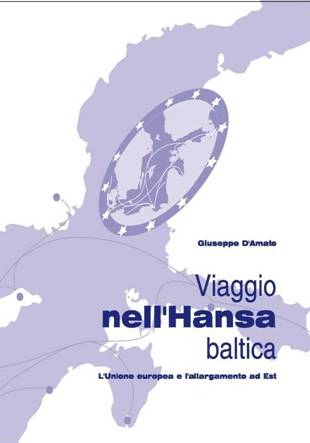Travel to the Baltic Hansa
ITALIANO
The EU enlargement to the East is an historical event that attracts the attention of the world’s public opinion. On May 1st, 2004 the southern Baltic region, along with the so called “Mitteleurope”, has emerged from the darkness of the Cold War, putting an end to the effects of the tragic pact Ribbentrop – Molotov, signed between Nazis and Comunists in August 1939.
After 13 year approach the Baltic area has adhered to the EU. Estonia, Latvia, Lithuania, Poland, and indirectly Russia are today part of one of the world’s fastest growing economic zones. Some experts have already written that a new Hanseatic League, a post-cold-war reincarnation of the mercantile monopoly that dominated Baltic trade in Middle Ages, was born. The greater Baltic region has a population of about 90 million and a GDP near one third of Japan’s. It’s the natural bridge between the developed West and the Asian markets.
Travel to the Baltic Hansa – written in Italian – is the report of a trip from Saint-Petersburg to Warsaw. The author tried to photograph these countries in this transition period: he has described common people reality, reported their thoughts and hopes, interviewed intellectuals and members of the elites. Special attention was also given to the historical roots of the fights and divisions that, in some cases, still remain today. Four Prime Ministers introduce their countries to the readers: the meaning of adhering to EU, what their countries will bring to EU, the new European Constitution, EU and NATO, the crisis in Iraq, domestic affairs.
The major aim of this book is to give the “Old European” readers the possibility of their approaching the new European citizens and getting to know the so often forgotten by international mass media Baltic region.
The book in brief
– Genre: Report, reportage.
– The book deals with socio-economic, historical, and common day aspects. It also gives the tourist description of the region.
PS. The introduction includes geographical description, socio-economic problems, people’ fears and hopes.
About the authors
Giuseppe D’Amato – journalist, historian. Accreditation at the Russian Foreign Ministry. He contributes to Italian and foreign media networks. Ph.D in history at Moscow’s Rggu (Russian State Humanitarian University) in 1994. Scholar of the Russian academician S.O.Schmidt. Edited books: Sočinenija italjančev o Rossii konca XV-XVI vekov (Italian reports on Russia 15-16 centuries), Russkoe slovo, Moskva,1995. In Russian.
Il Diario del Cambiamento (The Diary of the Change), Urss 1990 – Russia 1993. Greco e Greco, Milano, 1998. In Italian.
The preface is by
Almerico Di Meglio (1948), special correspondent for “Il Mattino di Napoli” (Naples).
One edited book: Viaggio tra le rovine dell’ex impero sovietico (Travel on the ruins of the former Soviet empire), ottobre – dicembre 1991 (october – december 1991). In appendix: interview with Francois Fejto, ed. Athena, Napoli, 2002.
TO BUY IT:
Send a message to: info@grecoegrecoeditori.it
Subject: Viaggio nell’Hansa baltica
Price 8 euros plus 3,70 mail charge
Visit site www.grecoegrecoeditori.it +39-02-58312811
==
Index
Preface by Almerico Di Meglio
Introduction
Saint-Petersburg (Russia)
– The Northern capital (Introduction; the town)
– Three hundred wonderful years (Saint-Peterburg in the history)
– “Saint-Putinsburg” (Putin and his team)
– The newly found jewel: The Amber Chamber (The best present for the celebrations)
– A fast growing economy (Future prospective for the region and today’s situation)
– Russia and European Union at a turning point
Estonia
– The new EU border: Narva, the separated town.
– Traveling around Estonia (Tartu and the arrival in Tallinn)
– “E-Estonia”, a country already living in the future (Introduction, the country)
– The struggle for Europe
– Clashes among the Orthodox Churches
– Prime Minister Parts: our dynamism for Europe
Main historical dates
Latvia
– The singing country (Introduction, Latvia)
– Night life in the Baltic region
– Pains from the history (The society is still split into two parts or more)
– Nikolajs Romanovskis “Nobody judges the winner!” (The head of Waffen SS who fought with Germans against the Red Army)
– Former liberators, today’s occupiers (The Jews at Riga’s Synagogue and the Russians tell their war)
– Leonid Koval: the “living memory” of the Catastrophe. (Jewish writer, candidate at the Nobel prize 2003)
– Prime Minister Repse: “EU as guarantee of stability”
Main historical dates
Lithuania
– The Baltic “Ireland” (introduction, the country)
– Petras Austrevicius <<EU: the hard but necessary integration>> (Austrevicius, the chief Lithuanian negotiator for EU accession)
– Farmers: doubts and pessimism (Farmers’ voice)
– The price for the accession: the sacrifice of the atomic power station in Ignalina.
– An influential Church
– Prime minister Brazauskas: “EU: a unique opportunity to grow”
Main historical dates
Kaliningrad (Former Eastern Prussia)
– The cumbersome past of the Amber Land (Introduction, Russian enclave, the relationship with the Germans)
– Bmw, the new German bet.
– The Baltic “gold” (In the factory where most of the world’s amber is produced)
– An unknown future (A tale from the Russian-Polish border, among the smugglers)
– The EU ecological check
Main historical dates
Poland
– “Europe, here we are!”
– EU: a difficult referendum (The hard fight for the accession)
– A travel to Poland during the referendum campaign (April – May 2003)
– In Europe with the dream of a work in the heart (Young people and their dreams)
– “Down with the EU!” (Peasants and conservative forces say “no” to the EU)
– The Polish Church at the vote (Catholic priests speak about the EU)
– From The Warsaw’s Ghetto. The testimony. (The tale of a Jewish woman who survived to the Holocaust)
– Gdansk, the “free” town
– <<Good morning, Europe!>> (The celebrations on May 1st)
– Prime Minister Miller: Our card for Europe
Main historical dates
A better future for the Balts
The new Hansa
Statistic data
The Hanseatic League in the history
Maps
List of the main sources





